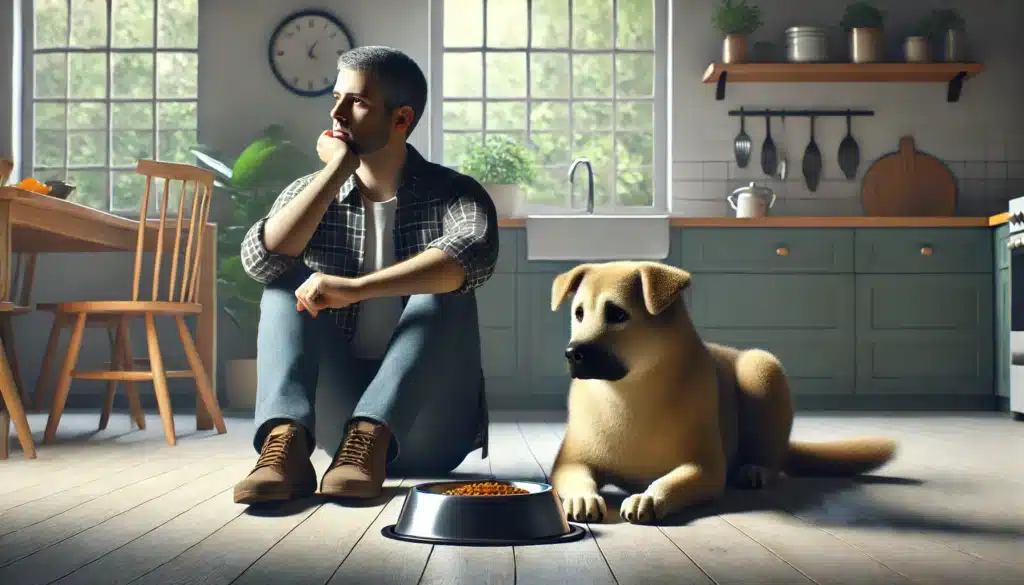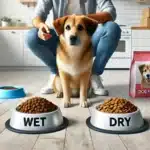It’s worrying when your dog suddenly turns away from their food bowl — especially if they’re usually excited for mealtime. While a skipped meal here or there may not be a big deal, loss of appetite can sometimes indicate something deeper, from stress or boredom to serious health concerns.
In this guide, we’ll explore the most common reasons why dogs stop eating, when to worry, and what you can do to help your dog regain a healthy appetite.
Is It Normal for Dogs to Skip a Meal?
Yes — occasionally. Dogs, like humans, may skip a meal from time to time due to:
- A change in environment
- Mild stomach upset
- Boredom with food
- Heat or weather changes
- Minor stress or anxiety
However, if your dog refuses food for more than 24–48 hours, especially when combined with other symptoms, it’s time to investigate.
Common Reasons Why Dogs Stop Eating
🧠 1. Behavioral or Emotional Causes
- New environment (travel, moving, boarding)
- Loss of a family member or pet
- Stress due to loud noises or visitors
- Depression or anxiety
Solution: Create a calm, predictable routine. Offer food in a quiet space. Don’t force-feed, but try hand-feeding or using puzzle feeders to stimulate interest.
🍲 2. Boredom or Picky Eating
- Eating the same food for months or years
- Feeding too many treats between meals
- Spoiled from “people food” or table scraps
Solution:
- Rotate between safe, high-quality dog foods
- Cut back on treats and eliminate table scraps
- Add a spoonful of wet food, broth, or plain yogurt as a topper
- Use food puzzles or change the feeding routine
🦷 3. Dental Problems
- Toothache, broken teeth, or gum inflammation
- Foreign objects stuck in the mouth
- Difficulty chewing dry kibble
Solution:
- Switch to soft or wet food temporarily
- Schedule a vet visit for a full oral exam
- Consider brushing your dog’s teeth regularly or using dental chews
🩺 4. Medical Issues
A sudden loss of appetite can be a symptom of:
- Gastrointestinal upset (vomiting, diarrhea, gas)
- Infections or viruses
- Kidney or liver disease
- Diabetes
- Pancreatitis
- Cancer
- Allergies or food sensitivities
Warning Signs to Watch For:
- Lethargy
- Vomiting or diarrhea
- Weight loss
- Bad breath
- Changes in drinking or urination
- Pain or discomfort when eating
Solution:
Contact your vet immediately if you notice these signs. Early diagnosis can make all the difference.
💊 5. Side Effects from Medication
Some antibiotics, painkillers, or treatments may reduce appetite.
Solution:
Ask your vet if a medication switch or timing adjustment is possible. Try feeding during the time of day your dog feels best.
What You Can Do at Home (Before the Vet)
If your dog is otherwise healthy, try these techniques:
✔️ Change the Presentation
- Warm the food slightly (enhances aroma)
- Add low-sodium chicken broth (without onion or garlic)
- Sprinkle in a spoonful of canned pumpkin or plain yogurt
- Use food toppers or mix in a small amount of wet food
✔️ Stick to a Schedule
- Offer food at consistent times (no free-feeding)
- Give 15–20 minutes to eat, then remove the bowl
- Don’t beg, bribe, or chase — this can create feeding anxiety
✔️ Increase Exercise
Physical activity boosts appetite. A longer walk or play session may help kickstart your dog’s hunger.
When to See a Vet
You should seek veterinary help immediately if:
- Your dog hasn’t eaten in over 24 hours (puppies, seniors, and small breeds need urgent care sooner)
- There are other symptoms like vomiting, diarrhea, coughing, or lethargy
- Your dog has a pre-existing condition like diabetes or kidney disease
- You suspect your dog ate something toxic or foreign
Your vet may recommend:
- Bloodwork or X-rays
- A change in diet or prescription food
- Medication to treat nausea or stimulate appetite
- A short-term feeding plan to reintroduce food safely
Special Cases: Puppies and Seniors
- Puppies can dehydrate or develop low blood sugar quickly. If your puppy refuses food for more than 12 hours, call your vet.
- Senior dogs may have dental pain, arthritis, or diminished senses — all of which affect appetite. Choose softer food and consult your vet.
Don’t:
- Force food into your dog’s mouth
- Offer large amounts of treats just to get them to eat
- Wait too long to act if symptoms persist
Final Thoughts: Loss of Appetite Is a Message
Your dog not eating is a form of communication. Whether it’s something minor like boredom or something more serious, it’s always worth paying attention.
Start with small adjustments at home, but trust your instincts — if your dog “just isn’t right,” it’s time to call the vet. With early action and a little love, most dogs bounce back quickly.







